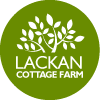After a couple of weeks absence, Dotty has returned with a sizeable clutch of chicks – fourteen, we reckon. These plus the seven that Fluffers had last week, and the ten that we are raising for meat, means that not only will our laying flock grow considerably in size, we’ll be putting 15 or so birds in the freezer for winter. They will at least have had a great (if short) life, and we know that they have been able to be truly free range, and where all their feed has come from.
Eating animals that we have raised ourselves took a while to get used to, and is definitely someting that we don’t do lightly. The process of raising, killing and preparing animals for food certainly gives you a respect for them, and we eat far less meat as a result. When we do, it takes on a significance that is missing from an anonymous cut of shrink wrapped meat bought over the counter.
Meat we don’t raise ourselves comes from friends who raise cattle in the same way – organic and free range, and although the cost is higher, we again eat it less often and it becomes something to look forward to and celebrate.
Why don’t we buy commercially produced meat? I could direct you to any number of websites showing some of the terrible conditions endured by animals raised in technically clean, well maintained surroundings, but denied anything approaching a natural life – pig units are a great example. Or I could direct you to videos of tens of thousands of chickens, living in cramped conditions, suffering the inevitable disease and injury that is the result of being intensively farmed.
You are maybe reassured by labelling schemes such as ‘Red tractor’. Yes? Well don’t be, because it guarantees no more than the legal minimum in most cases, and consumer reassurance is about all its good for. George Monbiot wrote about the subject recently and got a lot of flak for simply pointing out the truth.
I’ll leave you with a quote from that article –
The way that meat, eggs and milk are produced is surrounded by one of our great silences, in which most people collaborate. We don’t want to know, because knowing would force anyone with a capacity for empathy to change their diet.







